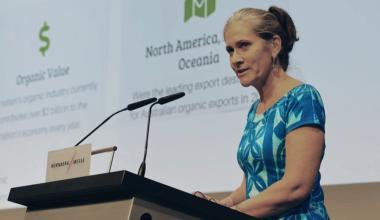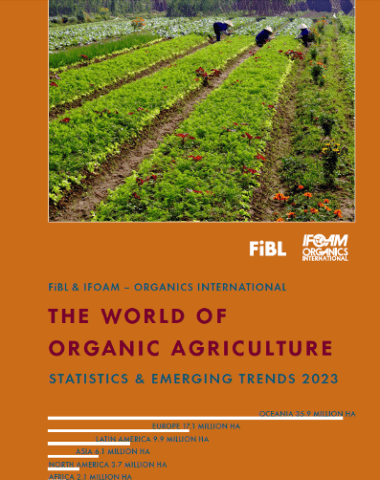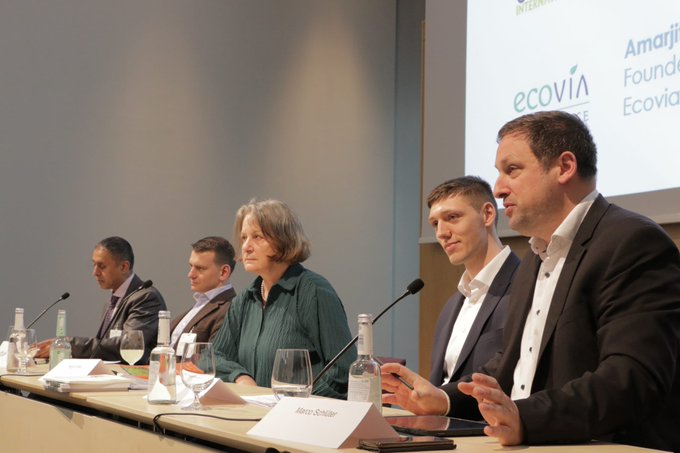“The World of Organic Agriculture” yearbook gathering global data from 2021 was presented at a BIOFACH session on Tuesday, 14 February 2023.
The latest data on organic farming worldwide was presented by the Research Institute of Organic Agriculture (FiBL) and IFOAM – Organics International at BIOFACH, the world’s leading trade fair for organic food.
Get detailed information on what transpired here!
In 2021, organic retail sales grew by 4 billion euros and reached almost 125 billion euros. Organic farmland grew to a global total of 76.4 million hectares.
Organic farmland and retail sales both continued to show growth worldwide, according to data from 191 countries (data as of the end of 2021). Published by FiBL and IFOAM – Organics International, the 24th edition of “The World of Organic Agriculture” shows the trend of overall growth seen in past years continued into 2021, although at a slower pace.
The annual survey on global organic agriculture is supported by the Swiss State Secretariat for Economic Affairs (SECO), the Sustainability Fund of Coop Switzerland, and Nürnberg Messe, organisers of the BIOFACH trade fair.
In 2021, the organic market reached almost 125 billion euros – an increase of nearly 4 billion euros or approximately 3 percent.
With 48.6 billion euros, the United States continued to be the world’s leading market, followed by Germany (15.9 billion euros) and France (12.7 billion euros). Swiss consumers spent the most on organic food (425 euros per capita on average), and Denmark continued to have the highest organic market share, with 13 percent of its total food market.
In 2021, 3.7 million organic producers were reported, an increase of 4.9 percent compared to 2020. India remained the country with the most organic producers (1.6 million). The majority of small-scale producers are certified in groups based on an internal control system.
A bit more than 76.4 million hectares were organically managed at the end of 2021, representing a growth of 1.7 percent or 1.3 million hectares compared to 2020. Australia had the largest organic agricultural area (35.7 million hectares), followed by Argentina (4.1 million hectares) and France (2.8 million hectares).
Organic farmland area increased in Africa, Asia, Europe and Oceania, while it decreased in the Americas. A bit less than half of the global organic agricultural land was in Oceania (35.9 million hectares). Europe had the second largest area (17.8 million hectares), followed by Latin America (9.9 million hectares).
In 2021, 1.6 percent of farmland around the world was organic. However, many countries have far higher shares: Liechtenstein had the largest organic share of total farmland (40.2 percent), followed by Samoa (29.1 percent) and Austria (26.5 percent). In 20 countries, 10 percent or more of all agricultural land was organic.
Outlook
Organic market growth appeared to stagnate in 2022. Reduced incomes and increasing prices for many consumer goods caused some population groups to reduce their spending on organic products.
Still, momentum for the organic sector continued to build around the world. Many countries kept up or initiated support activities for organic agriculture, including new action plans or policies aiming to foster growth. This positive trend was mirrored in the increase in fully implemented national regulatory frameworks for organic, which went up to a total of 74 globally.
The yearbook “The World of Organic Agriculture” (360 pages) presents the results of the annual survey on organic agriculture worldwide and has numerous tables, graphs, maps and infographics. It contains reports by experts on the organic sector and information on emerging trends across all regions as well as selected countries. It also provides background information on standards and legislation, policy support, and the global market for organic food.
The data on organic agriculture is collected annually by FiBL in collaboration with many partners from around the world. The results are published jointly with IFOAM – Organics International. The activities are supported by SECO, the Coop Sustainability Fund, and Nürnberg Messe, organisers of the BIOFACH trade fair.



